BRITISH AND GERMAN AIR-POWER
By NIGEL TANGYE
THE alleged might of the German Air Force lies as much in subtly emitted words and insinuations as in actual strength of material and personnel. There is no doubt whatever that the German Luftwaffe is still a much stronger weapon than the British Royal Air Force, but there is like- wise no doubt that it is not so invincible as we have allowed ourselves to believe. German superiority is almost entirely confined to the greater productive capacity of its factories. The apparent ease with which are turned out vast numbers of machines, coupled with a brilliant system of propaganda, has resulted in our judging the German aircraft industry to be directed by a legion of supermen. If we take stock of the situation and ignore the tendency, amounting some- times to an urge, to imagine the Luftwaffe to be invincible, we find ample grounds for encouragement. Indeed, one can go so far as to say that the Germans have nearly as much reason for anxiety as we have, and that every day their problems are growing while ours are lessening.
Although the productive capacity of the German aircraft industry is greater than ours, and the Luftwaffe is perhaps three times the numerical strength of the R.A.F., there is no doubt whatever that British machines are superior to German. The German industry is meeting with increasing difficulty with regard to materials, and the various substi- tutes for the real thing that have to be used gravely impair the aircraft efficiency.
There is indisputable evidence of this. Let me give some examples. Some years ago the German B.M.W. Com- pany bought the licence from America to build the Pratt and Whitney Wasp engine. From a designer who was employed in the factory up to two years ago I learned that the German version of the engine lost much of the efficiency of the original because many of the parts (the crankshaft was one) had to be redesigned and stiffened in order to allow for the inferior quality of the metal available. I did not hear of any other reference to this engine until a week or so ago, when I was shown a report from a most reliable witness who told an interesting tale. This man is an aircraft engineer working in a distant country, whose Government received delivery of some new Junkers 86K bombers six months ago. This type of machine is one of the two main types of bombers now being supplied in large quantities to the Luftwaffe. The particular machines to which he referred have proved most unsatisfactory, and have necessi- tated the employment of a permanent squad of German mechanics to look after them and keep them in the air. The engines (German-built Pratt and Whitneys) have to be stripped every thirty-five hours of flight. A British engine of similar power has a life of over ten times this. The tyres of these German machines are made of synthetic rubber, and their life is only forty hours. Equivalent British tyres have a life of anything up to twenty times this.
A British engineer recently returned from a visit to German factories confirms the anxiety that is felt there regarding the materials that are being used. An important part of a modern aero-engine is the reduction gear, which enables the propeller to revolve at a lower speed than the engine. On several occasions German engineers asked him about the tooth-loads on the reduction gear of British engines. They were having trouble with breakages. Yet the loads on the German gears were actually less than those commonly met with in British engines, which give us no trouble at all.
These few examples suffice to show that although the output of German aircraft factories is high, the quality leaves much to be desired, and is certainly inferior to ours.
But the Germans have another cause for deep anxiety when relative strengths of air weapons are considered. For months past the German aircraft industry has been organised on what approaches a war-footing. Factories have been turning out machines at nearly a war rate. On an outbreak of hostilities this rate can therefore not be increased to any extent. The British industry, on the other hand, has not touched a war rate nor anything like it. War may see our rate doubled, trebled, while that of German factories must virtually stand still. It is for this reason that the Nazi hierarchy will not indulge in a war unless it can be sure of a shock win ; and every day that passes makes the prospect of such a victory more remote.
German factories must always be vulnerable to raids, for all of them lie within range of enemy aircraft. Supply of machines to the Luftwaffe must always therefore be open to interruption. But Great Britain, by producing machines in Canada and in other parts of the Empire, can be certain that supply will never be completely stifled ; and the possibility, amounting to a certainty, that she will be able to obtain a steady supply of warplanes from America is a matter of the gravest concern to the German Air Staff.
If we consider the types of machines now being supplied to the British and German air forces we have good reason to be optimistic, although I must repeat that sheer superiority in numbers gives a lead to the Luftwaffe that must remain for some months yet. German first-line bombers are con- fined almost entirely to two types, the Domier 17 and the Junkers 86K. Both types can carry nearly a ton of bombs some 1,50o miles. The former has a top speed of about 280 miles an hour, and the latter about 23o miles an hour. The British counterpart to these machines (size for size) might be considered to be the Vickers Wellesley, which is one of the lightest bombers being used in the Royal Air Force. The Wellesley has a top speed of 23o miles an hour, a range similar to the two German machines, but a bomb-load nearly double. Supply of this type of machine has almost ceased, and in its place is the Vickers Wellington, which is a bigger bomber whose performance it is forbidden to reveal. One can only say that it is phenomenal and quite unapproached by anything that German has yet produced.
Indeed, we have quite a lot of machines up our sleeve which Germany is unable to match. Every week really heavy bombers, all with speeds around 25o miles an hour and more, are being supplied to the R.A.F., bombers which carry two and three times the load of bombs which the chosen lighter type of bombers of the Luftwaffe can carry. And a ppint not realised about the operation of these bombers against Germany is that the distance from the French frontier to Berlin is only twenty miles farther than the distance between the German frontier and London, provided the German raiders respect Dutch neutrality. Our fighters, type for type, give nothing to those of Germany, the fundamental difference between them being that German fighters are armed with cannon, while ours depend on multi- machine-gun armament. The performance of the German Heinkel and Messerschmidt fighters, which are the two standard types, is in no way superior to that of the British Spitfire and Hurricane, and one can reasonably assume that the reliability of the British machine is superior to that of the German.
In this brief review of comparative air strengths I have not mentioned the famous Bristol Blenheim bomber, hundreds of which are now in the hands of the R.A.F., nor have I mentioned the Armstrong-Whitworth " Whitley " heavy bomber, nor the Fairey " Battle," nor the Handley Page " Hampden." All these, and others, are fine machines whose performance can compare more than favourably with German first-line bombers. That the Luftwaffe possesses machines whose existence and performance it has been able to keep impenetrably secret is improbable in. the extreme.
In the stress and anxiety of the last few months it has been our habit to accept without question the overwhelming superiority of the Nazi air fleet. This superiority lies only in terms of numerical strength. This is the least important factor. It can be reduced in peace time if an effort is made, but it must inevitably be reduced in war, effort or no effort. The German Air Staff knows this. Our position is already strong, and every day that goes by sees us stronger. And in any war lasting more than two months our air forces ultimately would reign supreme.











































 Previous page
Previous page